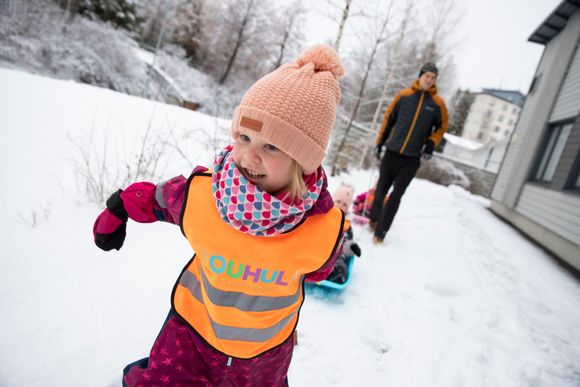
Activity bracelets for kids have been touted as Finland’s weapon against sedentary behaviour, but experts say kids need more than gimmicks to get moving.
Five-year-old Sani Heikkinen holds up her black fitness bracelet and says she scores points by wearing it at school. When these points add up, she can cash them in to play on a tablet.
This is the second year 5-year-olds at the private Touhula daycare centre in Kuopio have been using wearables to increase physical activity.
The proliferation of children’s activity bands grew out of revamped early childhood education guidelines in 2017 encouraging kids to clock up to three hours of exercise a day.
“The kids now average two hours a day of physical activity,” said Tiina Kohvakka, head teacher at Touhula’s Saaristokaupunki daycare in Kuopio. “It also lets parents know exactly how much exercise their kids are getting during the day.”
Obesity epidemic
Fifteen public daycare centres in Tampere adopted activity bands last year.
“Only 10-20 percent of under-school age children meet fitness recommendations. From a public health perspective, we have to do something to combat sedentary behaviour,” Mikko Leikkanen from the city of Tampere explained.
National health watchdog THL has reported that nearly a quarter of kids in Finland between the ages of two to 16 are overweight.
Parents and teachers have welcomed the wristbands, according to head teacher Kohvakka.
Henrikki Kattainen, a parent at Touhula’s Saaristokaupunki centre, told Yle that his daughter couldn’t wait to get her own tracker. But he said it was important that wearing the bands remained voluntary.
“Adults can’t force kids to wear them and the data shouldn’t place the kids in any sort of ranking,” he said.
Whose data is it anyway?
Data security is a real concern when it comes to fitness trackers, especially in terms of how the collected data is used, according to Arja Sääkslahti, a Jyväskylä University researcher specialised in sports pedagogy.
“Schools are the main gatekeepers,” she explained.
Last year Finnish fitness company Polar suspended its global activity map after news emerged that a flaw in the app revealed sensitive location data of users.
Touhula says the kids have individual trackers. Parents can plug into harvested data by downloading the connected app.
But Sääkslahti still has her concerns.
“We are venturing into a sensitive area. For the sake of anonymity, it would be better if fitness was tracked on a group–not individual–level,” she said.